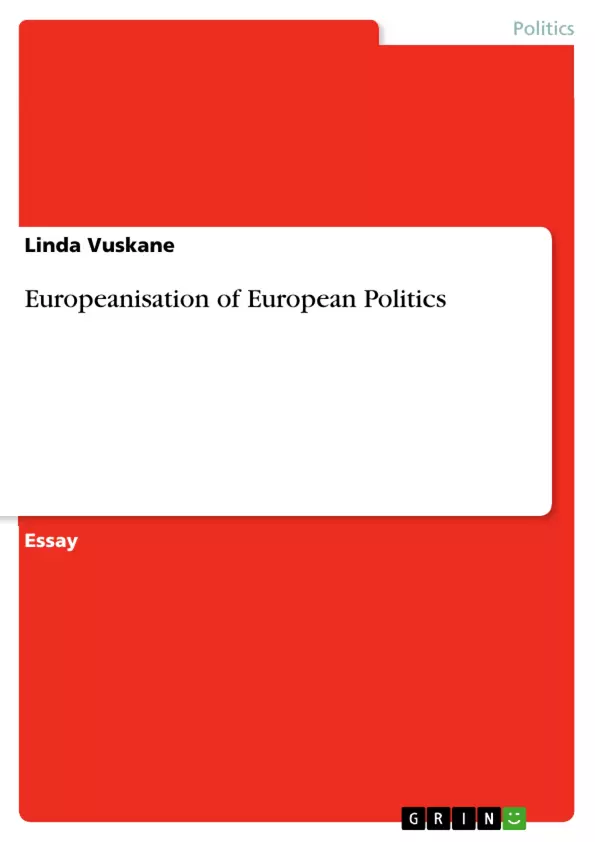The present essay will explore the dynamic and much contested concept of Europeanisation of European politics with a particular focus on the implications in Germany and France. In general, Europeanisation refers to the interactions between the EU and the member states and other countries. However, more recently the concept of Europeanisation has been applied in different ways and to different areas. The concept has also evolved over time as authors have come to consider different approaches and even stretched the concept to incorporate other aspects, which may not have seem relevant at first glance. However, Europeanisation can be distinguished from other concepts, such as European integration or convergence, although it can be difficult to separate the effects of Europeanisation from other sources of change, such as globalisation.
Inhaltsverzeichnis (Table of Contents)
- Europeanisation of European Politics
- Europeanisation: Definition and Concepts
- Institutional Perspective
- Top-Down Approach
- ‘Misfit’ Theory
- Mediating Institutional Characteristics
- Sociological Approaches
- Europeanisation from Below
- Europeanisation as a Heuristic Concept
- Europeanisation as an External Value
- Conclusion
Zielsetzung und Themenschwerpunkte (Objectives and Key Themes)
This essay explores the concept of Europeanisation of European politics, examining its dynamic and contested nature. The essay focuses on the implications of Europeanisation in Germany and France, while considering the broader context of European integration and the interactions between the EU and its member states. The essay further examines the various approaches to Europeanisation, including top-down and bottom-up perspectives, as well as the role of domestic actors, institutional factors, and societal norms in shaping the process. Finally, it delves into the concept of Europeanisation as an external value, considering its impact beyond the EU's borders.
- Defining and understanding Europeanisation
- Exploring the different approaches to Europeanisation (top-down, bottom-up)
- Analyzing the role of domestic factors in the Europeanisation process
- Investigating the impact of Europeanisation on national policies and institutions
- Examining the concept of Europeanisation as an external value
Zusammenfassung der Kapitel (Chapter Summaries)
The essay begins by defining the concept of Europeanisation and exploring its various interpretations, examining both institutional and domestic perspectives. It then delves into the top-down approach to Europeanisation, highlighting the role of EU institutions, policies, and processes in influencing national policies and institutions. This section includes a discussion of the ‘misfit’ theory, which suggests that an incompatibility between European and domestic frameworks is necessary for Europeanisation to occur. Furthermore, the essay examines the mediating role of institutional characteristics, such as veto points and formal institutions, and explores the influence of sociological factors, such as domestic norm entrepreneurs and cultural understandings, on the process of Europeanisation. The chapter concludes by analyzing the impact of Europeanisation on specific countries, such as Germany and France, highlighting the varying degrees of adaptation and change.
The next chapter delves into the concept of Europeanisation from below, emphasizing the growing influence of sub-national actors and non-governmental organizations (NGOs) in shaping the process. The chapter provides examples of how regional actors and NGOs have successfully engaged in Europeanisation efforts, influencing policies at the EU level and raising public awareness of European issues.
The final section of the essay examines Europeanisation as a heuristic concept, encompassing both ‘Europeanisation by design/reform’, which involves changes initiated by the EU, and ‘Europeanisation by default’, which focuses on incremental changes in domestic institutions driven by domestic actors. It also explores the concept of Europeanisation as an external value, considering its impact on neighboring countries and the EU's enlargement policy. This section concludes with a discussion of the broader significance of Europeanisation and its relationship to other concepts, such as European integration and convergence.
Schlüsselwörter (Keywords)
The main keywords and focus topics of this essay include Europeanisation, European integration, EU institutions, domestic change, top-down processes, bottom-up processes, national policies, institutional factors, societal norms, external values, enlargement policy, and convergence. The essay explores the dynamic interplay between these concepts and analyzes their impact on the evolving political landscape of Europe.
- Quote paper
- Linda Vuskane (Author), 2011, Europeanisation of European Politics, Munich, GRIN Verlag, https://www.grin.com/document/510371



